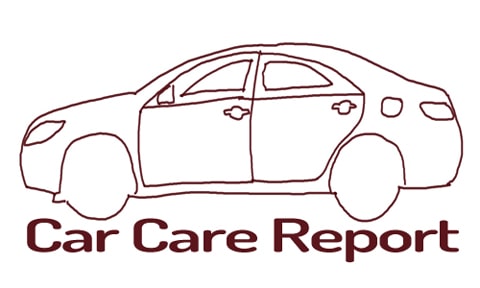Hard water can come from many different sources, and you can recognize it by its high levels of calcium and magnesium. Often, hard water can find its way to your car and cause unsightly spots. So, let’s talk about ways you can remove these pesky spots from your car.
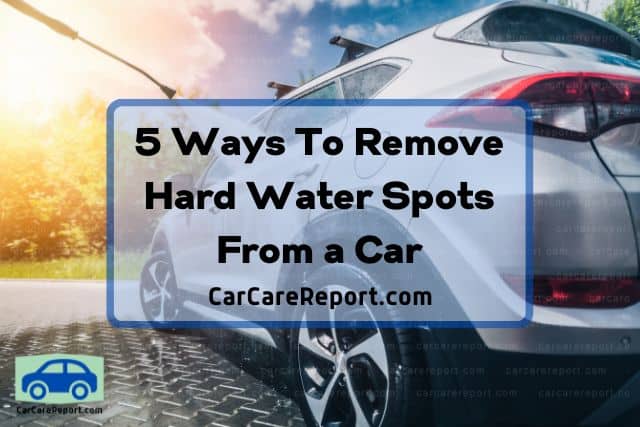
Here are 5 ways to remove hard water spots from your car:
- Deal with them right away.
- Use baking soda.
- Spray white vinegar.
- Spritz or squeeze on lemon juice.
- Use commercial products.
Let’s break down each of these ways a little further and help you get rid of those hard water spots. I will also talk a little bit about preventing hard water spots in the first place, as well as your options if none of the above ways work.
1. Deal With Them Right Away

One of the most efficient ways to remove hard water stains is to remove them as quickly as possible. The faster you clean hard water spots off your car, the easier they are to get off. Sometimes, they’ll just wipe right off if you notice them right away. But if left for a while, they become more difficult to deal with.
Hard water stains are left behind after unfiltered water comes in contact with your vehicle. Not all hard water is alike, though. Sometimes, the hard water that comes into contact with your car can have a higher concentration of minerals which makes them harder to remove.
No matter the severity of the hard water spot, it’s important to remove it as quickly as possible. Left untreated, hard water will start the etching process. This process happens when hard water dries on the surface of your car from heat caused by the sun. The process essentially seals in the hard water spot, making it very difficult to remove.
So, dealing with these spots as soon as you find them is vital to ensuring they don’t damage your car. If the spot remains untreated during the etching process, it can etch into your car’s paint, causing permanent damage. If this happens, there’s a good chance you’ll need to repaint your car.
The best way to deal with hard water spots is to ensure they don’t etch into the paint of your car by getting rid of them as quickly as you can. This makes the process easier by ensuring you won’t need to repaint the car. So, handle those pesky spots right away.
2. Use Baking Soda
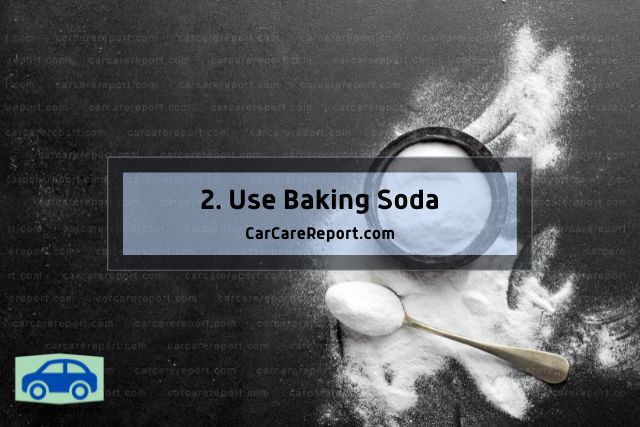
When removing hard water stains, baking soda is your best bet to get the job done. It’s much more effective than ordinary soap since it’s abrasive. So, baking soda can help dislodge those hard water deposits. At the same time, it’s not strong enough to ruin your vehicle’s paint if diluted properly.
If you want to use baking soda to get rid of those stains, here are the steps to take:
- Mix three parts baking soda and one part water. This will create a paste that dilutes the baking soda without toning down its effectiveness.
- Once you have your mixture, apply it to the hard water spots with a towel. Don’t be afraid to use plenty of the mixture as it won’t hurt your paint. So, apply it generously to the spots and gently rub it in.
- Leave it on for about 15 minutes before rinsing with clean water.
- After you’re done rinsing, make sure you dry the area completely.
Depending on how large the hard water spot is or how long it was there, you may need to repeat this process to ensure you completely remove it. If you still see the spots after this process, you can change it up a little bit by wiping the mixture off with a soft, clean towel instead. This may help finally lift those stains.
3. Spray White Vinegar
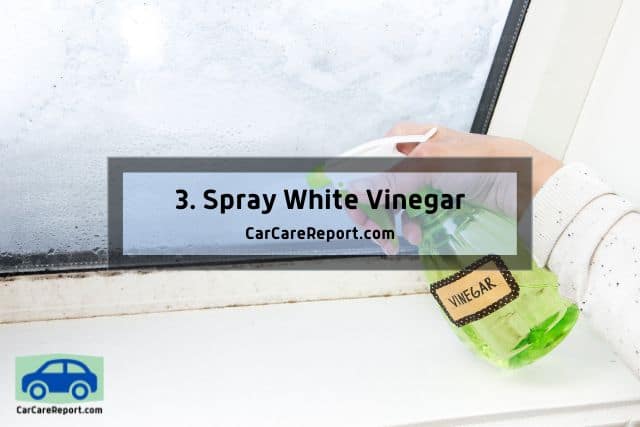
White vinegar is another fantastic solution for removing hard water stains from your car. It’s the safest type of vinegar to use for cleaning purposes because it doesn’t contain any coloring agents that can stain your car.
Also, vinegar is acidic, which makes it great for cleaning because the acid can dissolve those hard water stains without damaging the paint. Like baking soda, you’ll want to dilute the vinegar before using it.
To use white vinegar for cleaning hard water spots from your car:
- Make a mixture consisting of two parts white vinegar and one part water.
- Put the vinegar-water mixture in a spray bottle. This will help you cover all necessary areas. It’s particularly helpful because this mixture won’t have a paste-like consistency. So, spraying it from a bottle is easier than trying to pour it on specific areas.
- Spray the affected areas of your car.
- Rub the mixture in with a towel. A microfiber towel works best. If you don’t have one of those, an ordinary towel will work just fine. However, if you use a regular towel, you’ll probably need to add more of the mixture to ensure the spots come off.
- Unlike baking soda, you don’t need to leave the vinegar mixture on the surface for any amount of time. Simply rub the mixture in with a towel and rinse it off with clean water.
- Repeat the above process as necessary.
Keep in mind that the white vinegar mixture works better on new stains than stains that have been on your car for a while. So, try to get them off as fast as you can.
4. Spritz or Squeeze on Lemon Juice
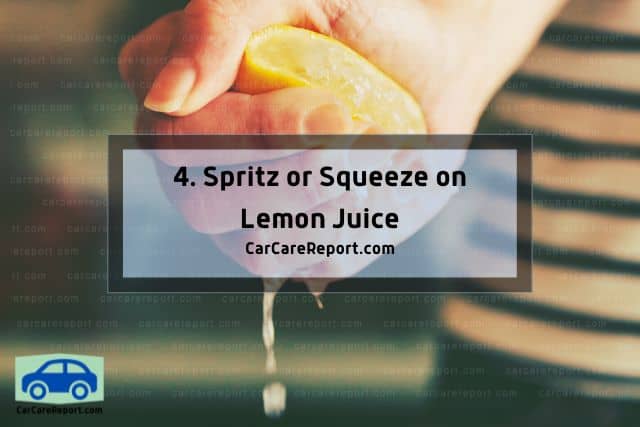
Lemon juice is another good way to remove hard water stains. If you don’t have any baking soda or white vinegar, you can try this method. Much like vinegar, lemon juice is acidic and will be a big help in removing hard water stains.
The specifics of using lemon juice don’t make too much of a difference. (Although, you will hear some people swear that fresh lemon juice is more effective.) So, use whatever you have available, but you may have more success with fresh lemon.
You can use lemon in one of two ways. The first way is to juice the lemon and put it in a spray bottle, much like the vinegar mixture. There’s nothing wrong with doing it this way, though having a juicer would make the job a little easier.
The alternative method is to cut the lemon in half and scrub the spot with the lemon itself. In this case, the lemon is the applicator. You can squeeze the lemon as you go to ensure that each spot gets enough juice to remove the stain.
Whichever method you choose, make sure you do the following:
- Scrub the lemon solution into the stain with either the lemon itself or a towel.
- Rinse the spot with clean water.
- Repeat this process as many times as you need to ensure that the spots are completely gone.
Lemon juice also works well when cleaning glass. So, feel free to also use it on your windows.
CarCareReport dot com is owner of this article and was first posted on Sep 22, 2022 and was updated on ..
5. Use Commercial Products
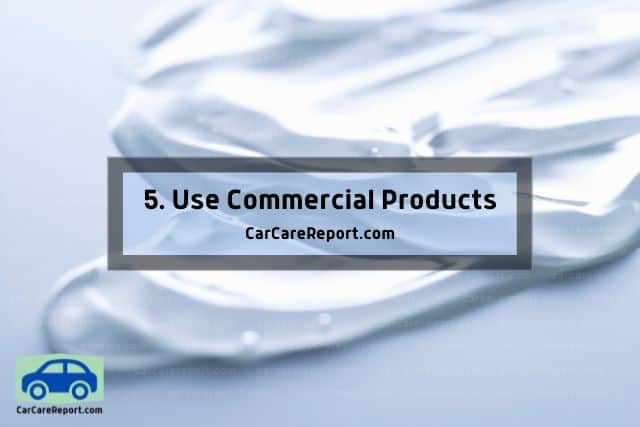
Plenty of commercial products can help you clean hard water spots from your vehicle. So, if you notice consistent water spots on your car, you may want to consider having one of these products on hand whenever you need it. Let’s talk about some products that can help.
3D Eraser Gel Water Spot Remover
This eraser gel (available on Amazon.com) is great for hard water removal. It’s easy to apply and gets rid of tough hard water spots. Because it’s so powerful, you need to follow the application directions carefully to prevent any damage to your car’s finish. As long as you follow the instructions, this product can help you easily get rid of tough spots.
This product contains no harmful ingredients. So, you can remove hard water spots from your car without worrying about harming the environment. 3D uses natural ingredients whenever possible in their solutions.
Nexgen Water Spot Remover
This spot remover spray is not only great for removing hard water spots, but it also helps prevent them in the future. You can use this formula to get rid of those tough, baked-in hard water spots by just spraying it on, buffing away the spots, and cleaning with fresh water.
Best of all, this spray doesn’t need to be left on for any amount of time, as it starts working instantly to get those stains off your car. You can reuse this product as many times as you need to ensure those tough spots are gone, but you probably won’t need to.
Meguiar’s Water Spot Remover & Multi-Surface Polish
This remover is another great way to get rid of tough water stains. To apply Meguiar’s Water Spot Remover, all you need is a towel, cotton ball, or something else you can use to scrub the surface of your vehicle. The great thing is that, to remove this product, you don’t need to rinse it off like the others. Instead, just use a clean towel to wipe off any leftover residue, and you’re done.
Be sure to buff those hard water stains with this product to get the most out of the formula. You can reuse it as many times as you need, though you’ll likely only need to do that for particularly difficult stains.
How to Prevent Hard Water Spots on Your Car
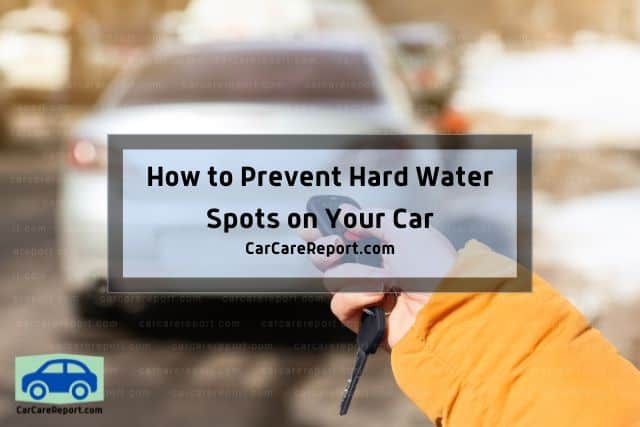
You can prevent hard water spots by avoiding or minimizing common causes, using preventative products, washing your car in filtered water, and making sure your car is completely dry. Following these steps can help you avoid etching and damage.
Because hard water can come from so many different places, avoiding it altogether can be impossible. So, instead of avoiding hard water itself, let’s talk about how you can prevent it from staining your car and etching into the paint.
Use a Wax Coating That Doesn’t Dry Water on Your Car
You can’t get hard water spots if the water doesn’t dry on the surface of your vehicle. No product is going to help do that perfectly, but it’s always a good idea to take preventative measures. If you consistently apply any finish to prevent hard water from getting through, that’s usually enough.
First published on Sep 22, 2022 by CarCareReport.com.
Some hard water removers have preventative features as well, like the Nexgen Water Spot Remover I explained above. So, consider a product like this if you frequently experience hard water spots to prevent them in the future.
Wash Your Car With Filtered Water
If a coating isn’t an option or isn’t enough to keep them away, always make sure you’re washing your car with filtered water. This will prevent you from accidentally causing water spots when washing your car. Also, be sure to dry your car completely after washing it. This will further prevent hard water spots because it prevents them from baking into the paint.
Keep an Eye Out for Avoidable Causes of Hard Water Spots
For example, if your neighbor’s sprinklers tend to hit your car, this may seem harmless. However, you should know that rogue sprinklers are the leading cause of water spots on cars. So, consider moving your car away to avoid the sprinklers if possible.
What Should You Do if None of These Hard Water Removal Options Work?
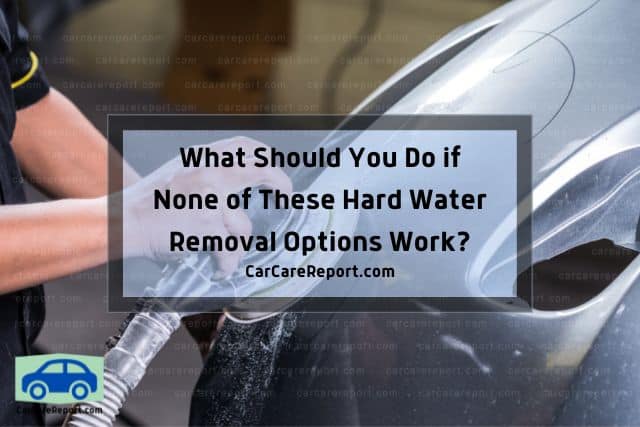
If none of the above hard water removal options work, you will need to consider sanding or a new paint job. This is the worst-case scenario for hard water spots, but you may have to consider this if they are left too long on the surface of your car.
You can do each of the above methods for removing hard water stains in the comfort of your own home. However, sometimes you may need professional intervention to help your vehicle. If you need wet sanding or a fresh paint job, you may want to take your car to a professional to be safe.
If your car needs sanding or fresh paint, an auto body shop can get the job done for you without causing further damage and ensuring the rest of your car’s paint is safe. So, if none of the above methods work for you, consider consulting with a professional.
Related Articles
How To Remove Buffing Marks on a Car
Waxed vs. Unwaxed Car: 13 Important Differences
How To Hide Swirl Marks on a Car (DIY Guide)
Is Ceramic Car Wax Worth It? How To Decide
CarCareReport dot com first published this article on Sep 22, 2022..
